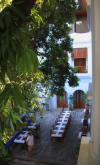|
|
the-south-asian.com October - December 2008 |
|
|||
|
Art - Sachin Pilot - Milind Deora - Jyotiraditya Scindia
Films
Health
|
|
||||
|
Pondicherry - Shades of Provence By Priya Tandon Sachdev ‘Not much to see, but a lot to feel’ reads Pondicherry’s tourism slogan. This tiny city of a million people, on India’s south-eastern coast, is 150 miles south of Chennai – a comfortable three-hour drive. Sections of the city have a French-Mediterranean flavour – almost a touch of Provence - and French is among the official languages of Pondicherry. This wonderful haven of tranquillity was in fact founded by the French, along the waters of the Bay of Bengal, more than three hundred years ago. Captured, sacked and destroyed at different times by different colonial powers – the Dutch and the British – it came back into the hands of its founders who rebuilt it and it remained the sole French colony on Indian soil till 1956 – when it rejoined India and was given the status of a Union Territory. Though officially known as Puducherry (since 2006), ‘New Village’, it is still fondly called Pondy. Strangely, a small 9 sq km part of the territory lies on the opposite south-western coast along the Arabian Sea! The French Quarter of the city is a tree-lined section of brick streets, striking architecture, pastel Catholic churches, ochre and white houses with wooden shutters, wrought-iron balconies, doorways and gateways drooping with floral creepers. Some of the older private homes and governors’ mansions have been restored and converted to boutique hotels. The 18th century Education Department reopened as the 16-room Hôtel de l’Orient in 2000. This neighbourhood was also once known as Ville Blanche, or White Town. Pondy is emerging as a savvy and an arty place. It is known for its marbled fabric, ceramics, hand-made stationery, and leather goods. Its peace and tranquillity perhaps drew Sri Aurobindo here, whose followers built Auroville - a Utopian community of people from more than 40 countries. Priya Tandon writes of her recent short trip to Pondy.
Read the entire story in the October - December 2008 print edition of The South Asian Life & Times Annual subscription Rs 500 (India) US $40 or GBP 20 (Elsewhere) To subscribe, write to
|
|||||
|
Copyright © 2000 - 2008 [the-south-asian.com]. Intellectual Property. All rights reserved. |
|||||
